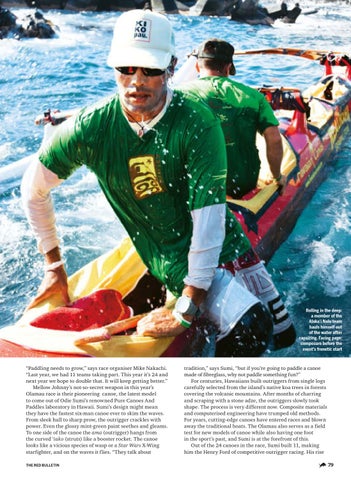Rolling in the deep: a member of the Alaka‘i Nalu team hauls himself out of the water after capsizing. Facing page: composure before the event’s frenetic start
“Paddling needs to grow,” says race organiser Mike Nakachi. “Last year, we had 11 teams taking part. This year it’s 24 and next year we hope to double that. It will keep getting better.” Mellow Johnny’s not-so-secret weapon in this year’s Olamau race is their pioneering canoe, the latest model to come out of Odie Sumi’s renowned Pure Canoes And Paddles laboratory in Hawaii. Sumi’s design might mean they have the fastest six-man canoe ever to skim the waves. From sleek hull to sharp prow, the outrigger crackles with power. Even the glossy mint-green paint seethes and gleams. To one side of the canoe the ama (outrigger) hangs from the curved ‘iako (struts) like a booster rocket. The canoe looks like a vicious species of wasp or a Star Wars X-Wing starfighter, and on the waves it flies. “They talk about the red bulletin
tradition,” says Sumi, “but if you’re going to paddle a canoe made of fibreglass, why not paddle something fun?” For centuries, Hawaiians built outriggers from single logs carefully selected from the island’s native koa trees in forests covering the volcanic mountains. After months of charring and scraping with a stone adze, the outriggers slowly took shape. The process is very different now. Composite materials and computerised engineering have trumped old methods. For years, cutting-edge canoes have entered races and blown away the traditional boats. The Olamau also serves as a field test for new models of canoe while also having one foot in the sport’s past, and Sumi is at the forefront of this. Out of the 24 canoes in the race, Sumi built 11, making him the Henry Ford of competitive outrigger racing. His rise 79
